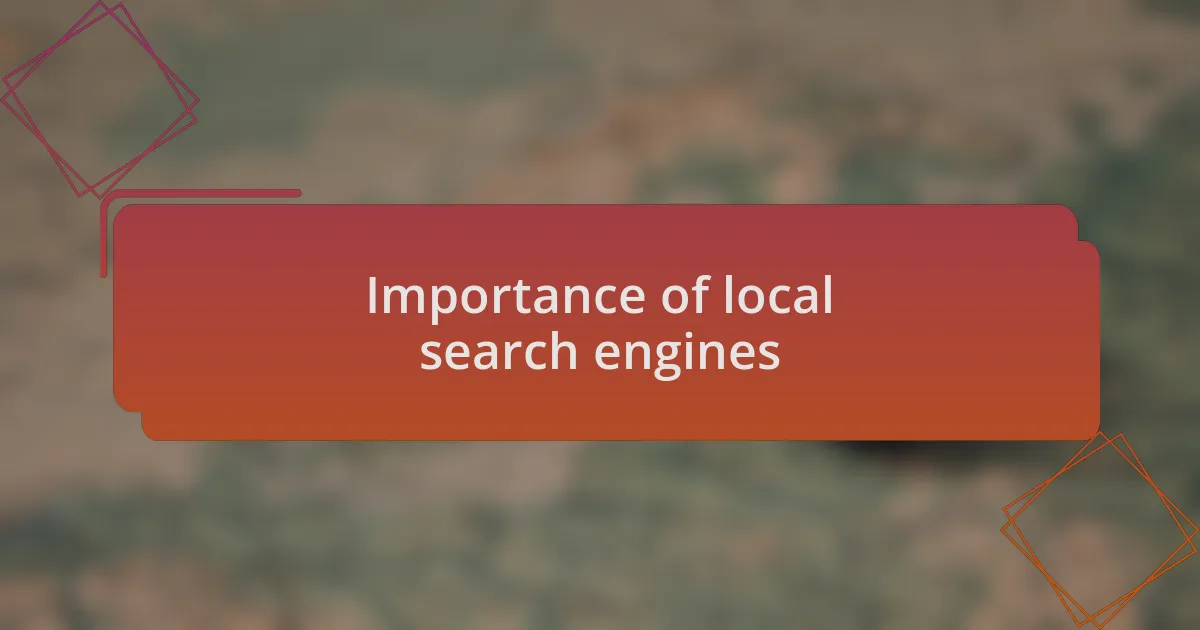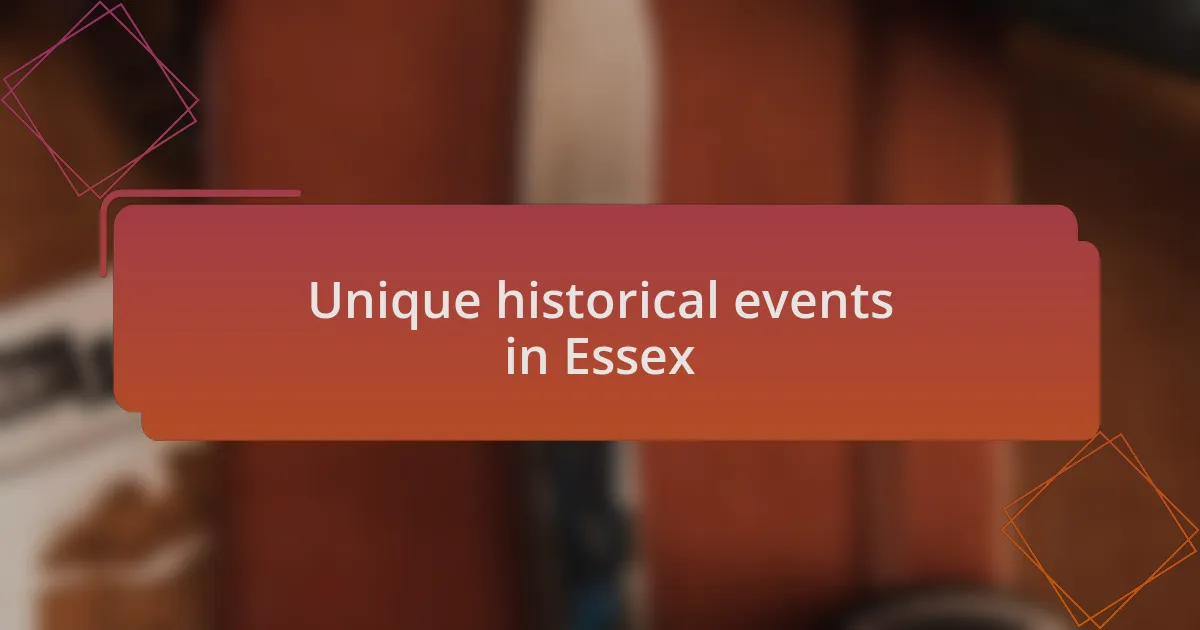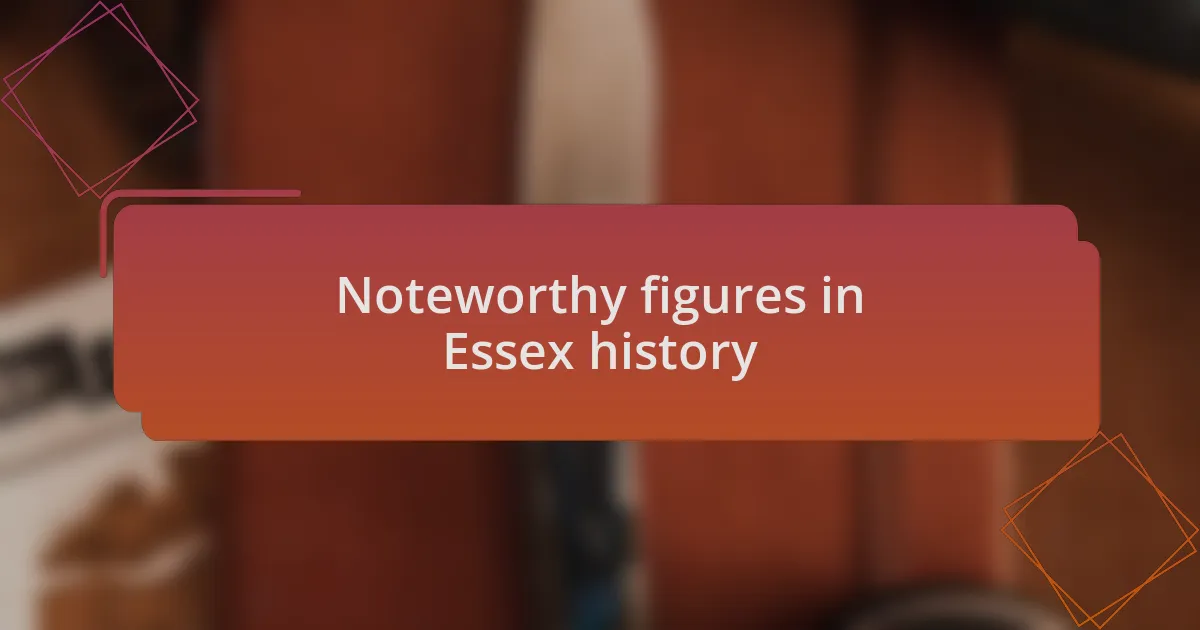Key takeaways:
- Local history, such as the stories of Essex, connects individuals to their community and shapes their identity through shared experiences.
- Significant historical events in Essex, like the Battle of Colchester and the Great Storm of 1987, highlight resilience and community spirit.
- Notable figures from Essex, including poet Christopher Marlowe and social reformer Joseph Sturge, offer insights into the region’s cultural contributions and social progress.
- Understanding local history fosters a deeper connection to the environment and inspires contemporary communal responsibilities.

Understanding local history significance
Understanding local history is like peeling back layers of an onion; each layer uncovers stories that shape our present. I remember walking through a quaint village in Essex, feeling the weight of history in the cobblestones beneath my feet. It made me wonder—how many lives intersected here, and what tales are hidden within those silent stones?
When we grasp the significance of local history, we connect more deeply with our community. I often find myself reflecting on the places I’ve lived and how their pasts influence their present. For instance, an old pub in my town is tied to countless celebrations and quiet moments, reminding me that history isn’t just about the grand events but also about the small, everyday experiences that bind us together.
Delving into local history also offers valuable lessons for future generations. Have you ever thought about how the struggles and triumphs of those before us can guide our paths? For me, learning about the resilience of communities in Essex during tough times instills a sense of pride and responsibility. It’s a reminder that we’re part of a larger narrative, and understanding that can inspire us to contribute positively to our own story.

Importance of local search engines
Local search engines play a pivotal role in connecting communities with the services and information they need. I recall a time when I was searching for a local artisan coffee shop in Essex. The convenience of a local search engine not only pointed me to the nearest spot but also unveiled hidden gems I hadn’t known about, enriching my experience and supporting local business owners.
Additionally, local search engines foster a sense of belonging within communities. I remember when I moved to a new town and used a local search tool to explore nearby museums and parks. It felt empowering to quickly link up with local culture and history, reminding me that every corner of Essex has unique stories to tell. This engagement helps to cultivate a network of support among residents, enhancing the overall community spirit.
Moreover, local search engines can boost local economies by highlighting smaller businesses that may otherwise be overlooked. I’ve seen firsthand how a small bakery in my neighborhood gained popularity through local search visibility. It’s fascinating to think about how a single search query can uplift a business, demonstrating the power of technology in our day-to-day lives. Don’t you think that every community deserves to be celebrated and supported in this way?
Overview of Essex’s local history
Essex’s local history is a tapestry woven from various threads, including its Roman roots, medieval landscapes, and maritime heritage. Walking through towns like Colchester, which boasts the oldest recorded town status in Britain, I often find myself reflecting on the layers of history surrounding me. Did you know that Colchester was once the capital of Roman Britain? It’s incredible to think about the ancient structures that still exist beneath our feet.
Once you peel back the layers, you can see how the industrial revolution transformed Essex, particularly in places like Chelmsford, where engineering and innovation flourished. One time, while exploring a local museum, I stumbled upon an exhibit showcasing the famous Marconi radio inventions. It was fascinating to realize that I was standing in the very birthplace of significant technological advancements that shaped communications. How often do we appreciate these historical milestones that influenced not just our county but the world?
Additionally, Essex’s connection to its coastal geography has led to a rich maritime tradition. I recall visiting Harwich, where the Port of Harwich has played a crucial role in international trade since the 14th century. It was moving to sit by the waterfront and think about the countless stories of sailors and traders who have passed through over the centuries. Have you ever considered how the ebb and flow of tides might reflect the ongoing narrative of a place? Through its diverse history, Essex continues to evolve while holding dear to its unique identity.

Unique historical events in Essex
One of the most fascinating events in Essex’s history occurred during the English Civil War, specifically the Battle of Colchester in 1648. As I walked along the walls of this ancient town, I felt a sense of gravity knowing it was once a stronghold for the Royalists. It’s staggering to consider how the motivations and struggles of those time-worn fighters still echo in the very fabric of the city today. Have you ever wondered how such pivotal moments shape the character of a place?
Another notable event is the Great Storm of 1987, which brought devastation but also remarkable resilience to Essex. I recall sitting in my living room, watching the howling winds outside, and worrying about the old oak trees in my garden. The aftermath revealed a changed landscape, yet it also showcased the community’s spirit as neighbors rallied to help clear the debris and restore order. This unique blend of adversity and camaraderie is something I cherish in our local narrative. Isn’t it impressive how nature can bring both destruction and unity?
Then there’s the iconic event of the 2012 London Olympics, where Essex hosted some of the football matches. Being a sports enthusiast, I felt a surge of pride as I attended one of the games at the impressive new stadium in the heart of the county. The atmosphere was electric, filled with a diverse mix of fans, showcasing Essex as more than just a quiet corner of England. How often do we get to witness our local areas transforming into stages for global events?

Noteworthy figures in Essex history
While exploring notable figures in Essex history, one can’t overlook the prolific contributions of poet and playwright Christopher Marlowe. As I walked through the quaint streets of Canterbury, I couldn’t help but think about how this local talent shaped English drama and literature. His works, often filled with an intense emotional depth, reflect the richness of Essex’s culture. Can you imagine how his upbringing in this region influenced his creative genius?
Another figure worth mentioning is the infamous highwayman Dick Turpin, who has become somewhat of a folk hero. I remember hearing stories of his daring escapades during my childhood and how he embodied both the romanticism and danger of the time. His legacy, a mix of gallantry and crime, serves as a reminder of the turbulent social issues that existed. What do these legends tell us about the values people held in the past?
Lastly, I find the impact of social reformer Joseph Sturge quite remarkable. His dedication to philanthropy and social justice initiatives in the early 19th century still resonates today. Visiting the historical sites tied to his life, I felt a deep appreciation for those who fought for equality. It raises a significant question: how can we continue to honor the legacies of such figures and apply their lessons to our contemporary issues?
Personal reflections on Essex’s history
As I reflect on my own experiences exploring the sites tied to Essex’s history, I can’t help but feel a strong connection to the past. Walking along the River Chelmer, I marveled at how the waterways played a crucial role in trade and transport, shaping the very fabric of daily life. It makes me wonder: how many stories are still hidden beneath the surface of those waters, waiting to be uncovered?
Visiting the ruins of Hylands House, I felt a sense of nostalgia wash over me. The grandeur of the architecture contrasted sharply with the tales of the genteel society that once flourished there, reminding me of how the echoes of the past can both inspire and haunt us. Isn’t it fascinating to think about how these spaces once buzzed with life, and now stand as silent witnesses to centuries of change?
I often ponder how the agricultural history of Essex, with its rich soil and farming traditions, has shaped not just the land but also the people who live here. As I listened to the stories of local farmers at a community fair, I realized how deep-rooted their connection to the land is. It raises an important thought: how does our understanding of local history influence our relationship with our environment today?